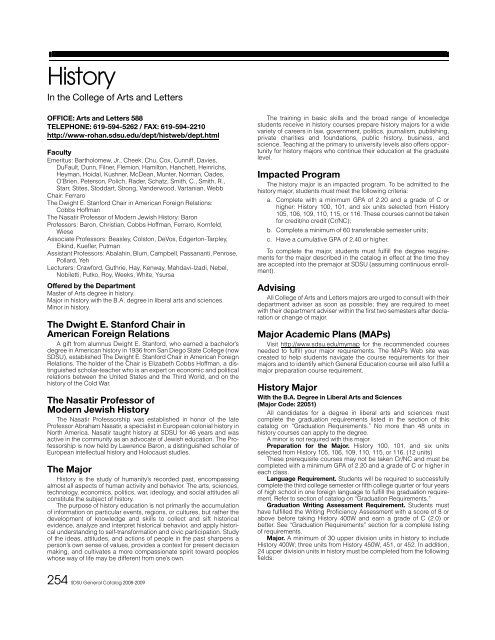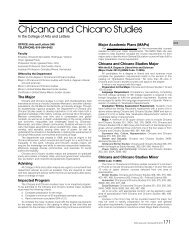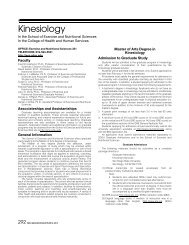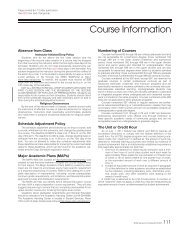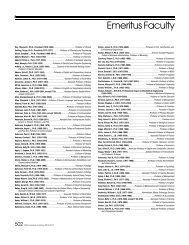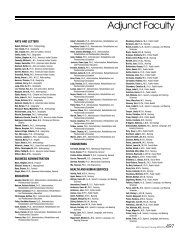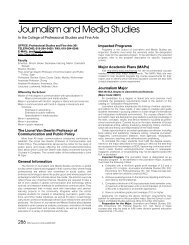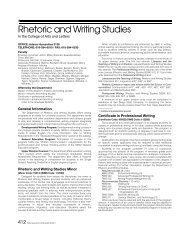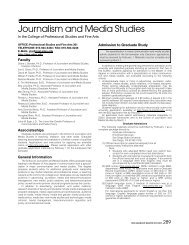History - SDSU
History - SDSU
History - SDSU
You also want an ePaper? Increase the reach of your titles
YUMPU automatically turns print PDFs into web optimized ePapers that Google loves.
<strong>History</strong><br />
In the College of Arts and Letters<br />
OFFICE: Arts and Letters 588<br />
TELEPHONE: 619-594-5262 / FAX: 619-594-2210<br />
http://www-rohan.sdsu.edu/dept/histweb/dept.html<br />
Faculty<br />
Emeritus: Bartholomew, Jr., Cheek, Chu, Cox, Cunniff, Davies,<br />
DuFault, Dunn, Filner, Flemion, Hamilton, Hanchett, Heinrichs,<br />
Heyman, Hoidal, Kushner, McDean, Munter, Norman, Oades,<br />
O’Brien, Peterson, Polich, Rader, Schatz, Smith, C., Smith, R.,<br />
Starr, Stites, Stoddart, Strong, Vanderwood, Vartanian, Webb<br />
Chair: Ferraro<br />
The Dwight E. Stanford Chair in American Foreign Relations:<br />
Cobbs Hoffman<br />
The Nasatir Professor of Modern Jewish <strong>History</strong>: Baron<br />
Professors: Baron, Christian, Cobbs Hoffman, Ferraro, Kornfeld,<br />
Wiese<br />
Associate Professors: Beasley, Colston, DeVos, Edgerton-Tarpley,<br />
Elkind, Kuefler, Putman<br />
Assistant Professors: Abalahin, Blum, Campbell, Passananti, Penrose,<br />
Pollard, Yeh<br />
Lecturers: Crawford, Guthrie, Hay, Kenway, Mahdavi-Izadi, Nebel,<br />
Nobiletti, Putko, Roy, Weeks, White, Ysursa<br />
Offered by the Department<br />
Master of Arts degree in history.<br />
Major in history with the B.A. degree in liberal arts and sciences.<br />
Minor in history.<br />
The Dwight E. Stanford Chair in<br />
American Foreign Relations<br />
A gift from alumnus Dwight E. Stanford, who earned a bachelor’s<br />
degree in American history in 1936 from San Diego State College (now<br />
<strong>SDSU</strong>), established The Dwight E. Stanford Chair in American Foreign<br />
Relations. The holder of the Chair is Elizabeth Cobbs Hoffman, a distinguished<br />
scholar-teacher who is an expert on economic and political<br />
relations between the United States and the Third World, and on the<br />
history of the Cold War.<br />
The Nasatir Professor of<br />
Modern Jewish <strong>History</strong><br />
The Nasatir Professorship was established in honor of the late<br />
Professor Abraham Nasatir, a specialist in European colonial history in<br />
North America. Nasatir taught history at <strong>SDSU</strong> for 46 years and was<br />
active in the community as an advocate of Jewish education. The Professorship<br />
is now held by Lawrence Baron, a distinguished scholar of<br />
European intellectual history and Holocaust studies.<br />
The Major<br />
<strong>History</strong> is the study of humanity’s recorded past, encompassing<br />
almost all aspects of human activity and behavior. The arts, sciences,<br />
technology, economics, politics, war, ideology, and social attitudes all<br />
constitute the subject of history.<br />
The purpose of history education is not primarily the accumulation<br />
of information on particular events, regions, or cultures, but rather the<br />
development of knowledge and skills to collect and sift historical<br />
evidence, analyze and interpret historical behavior, and apply historical<br />
understanding to self-transformation and civic participation. Study<br />
of the ideas, attitudes, and actions of people in the past sharpens a<br />
person’s own sense of values, provides a context for present decision<br />
making, and cultivates a more compassionate spirit toward peoples<br />
whose way of life may be different from one’s own.<br />
254 <strong>SDSU</strong> General Catalog 2008-2009<br />
The training in basic skills and the broad range of knowledge<br />
students receive in history courses prepare history majors for a wide<br />
variety of careers in law, government, politics, journalism, publishing,<br />
private charities and foundations, public history, business, and<br />
science. Teaching at the primary to university levels also offers opportunity<br />
for history majors who continue their education at the graduate<br />
level.<br />
Impacted Program<br />
The history major is an impacted program. To be admitted to the<br />
history major, students must meet the following criteria:<br />
a. Complete with a minimum GPA of 2.20 and a grade of C or<br />
higher: <strong>History</strong> 100, 101, and six units selected from <strong>History</strong><br />
105, 106, 109, 110, 115, or 116. These courses cannot be taken<br />
for credit/no credit (Cr/NC);<br />
b. Complete a minimum of 60 transferable semester units;<br />
c. Have a cumulative GPA of 2.40 or higher.<br />
To complete the major, students must fulfill the degree requirements<br />
for the major described in the catalog in effect at the time they<br />
are accepted into the premajor at <strong>SDSU</strong> (assuming continuous enrollment).<br />
Advising<br />
All College of Arts and Letters majors are urged to consult with their<br />
department adviser as soon as possible; they are required to meet<br />
with their department adviser within the first two semesters after declaration<br />
or change of major.<br />
Major Academic Plans (MAPs)<br />
Visit http://www.sdsu.edu/mymap for the recommended courses<br />
needed to fulfill your major requirements. The MAPs Web site was<br />
created to help students navigate the course requirements for their<br />
majors and to identify which General Education course will also fulfill a<br />
major preparation course requirement.<br />
<strong>History</strong> Major<br />
With the B.A. Degree in Liberal Arts and Sciences<br />
(Major Code: 22051)<br />
All candidates for a degree in liberal arts and sciences must<br />
complete the graduation requirements listed in the section of this<br />
catalog on “Graduation Requirements.” No more than 48 units in<br />
history courses can apply to the degree.<br />
A minor is not required with this major.<br />
Preparation for the Major. <strong>History</strong> 100, 101, and six units<br />
selected from <strong>History</strong> 105, 106, 109, 110, 115, or 116. (12 units)<br />
These prerequisite courses may not be taken Cr/NC and must be<br />
completed with a minimum GPA of 2.20 and a grade of C or higher in<br />
each class.<br />
Language Requirement. Students will be required to successfully<br />
complete the third college semester or fifth college quarter or four years<br />
of high school in one foreign language to fulfill the graduation requirement.<br />
Refer to section of catalog on “Graduation Requirements.”<br />
Graduation Writing Assessment Requirement. Students must<br />
have fulfilled the Writing Proficiency Assessment with a score of 8 or<br />
above before taking <strong>History</strong> 400W and earn a grade of C (2.0) or<br />
better. See “Graduation Requirements” section for a complete listing<br />
of requirements.<br />
Major. A minimum of 30 upper division units in history to include<br />
<strong>History</strong> 400W; three units from <strong>History</strong> 450W, 451, or 452. In addition,<br />
24 upper division units in history must be completed from the following<br />
fields:
Field (a). Thematic, Comparative, and Interdisciplinary <strong>History</strong>:<br />
Nine units selected from <strong>History</strong> 402, 406, 422, 435, 436, 440, 441, 442,<br />
470, 486, 488, 495, 496, 499, 500, 516, 527, 548, 580, 581, 582, 583,<br />
584, 596.<br />
Field (b). The Ancient Through Early Modern World: Six units<br />
selected from <strong>History</strong> 404, 405, 407, 409, 411, 413, 415, 420, 473, 496,<br />
499, 501, 502, 503, 506, 507, 513, 528, 532, 550, 563, 566.<br />
Field (c). The Modern World: Nine units selected from <strong>History</strong><br />
408, 410, 412, 416, 418, 421, 423, 445, 474, 496, 499, 509, 512A,<br />
512B, 515, 517, 518, 533A, 533B, 535, 536, 539, 540, 543, 544A,<br />
544B, 545, 551, 552, 558, 564, 567, 570, 574, 585.<br />
At least 15 upper division units must be at the 500-level. Up to<br />
six units from other departments may be applied to the history major<br />
upon written approval of the undergraduate adviser. Up to six units of<br />
study abroad history courses may be applied to the history major upon<br />
prior written approval of the undergraduate adviser. It is the student’s<br />
obligation to determine which courses fulfill his/her field requirements.<br />
<strong>History</strong> Minor<br />
The minor in history consists of a minimum of 18 units in history to<br />
include six sequential units in the lower division. Twelve units must be<br />
in upper division history, including three units at the 500-level, distributed<br />
in no more than two of the fields listed under the history major.<br />
Courses in the minor may not be counted toward the major, but<br />
may be used to satisfy preparation for the major and general<br />
education requirements, if applicable. A minimum of six upper division<br />
units must be completed in residence at San Diego State University.<br />
<strong>History</strong> Honors Thesis<br />
The department offers undergraduates of superior achievement<br />
the opportunity to write a history honors thesis leading to special recognition<br />
upon graduation. <strong>History</strong> 490, Senior Honors Thesis, is open<br />
to students who rank in the top 20 percent of senior history majors and<br />
who have successfully completed <strong>History</strong> 400W. Interested students<br />
should consult the honors thesis adviser in the Department of <strong>History</strong>.<br />
Courses (HIST)<br />
Refer to Curricula and Courses and University Policies sections of<br />
this catalog for explanation of the course numbering system, unit or<br />
credit hour, prerequisites, and related information.<br />
LOWER DIVISION COURSES<br />
HIST 100. World <strong>History</strong> (3) [GE]<br />
Growth of civilizations and interrelationships of peoples of Europe,<br />
Asia, Africa, and the Americas to 1500.<br />
HIST 101. World <strong>History</strong> (3) [GE]<br />
Modern history from a global perspective, 1500 to present.<br />
HIST 105. Western Civilization to the Seventeenth<br />
Century (3) [GE]<br />
Development of Mediterranean and European cultures, thought,<br />
and institutions from ancient times to the seventeenth century. Not<br />
open to students with credit in <strong>History</strong> 305A.<br />
HIST 106. Western Civilization Since the Sixteenth<br />
Century (3) [GE]<br />
Development of European cultures, thought, and institutions from<br />
sixteenth century to present. Not open to students with credit in <strong>History</strong><br />
305B.<br />
HIST 109. American <strong>History</strong> to Reconstruction (3) [AI]<br />
United States history from pre-colonial societies to Reconstruction.<br />
Contact of cultures, patterns of settlement, contests over racial, ethnic,<br />
religious, class, gender, regional, and national identities and institutions.<br />
Satisfies the American Institutions requirement in American history<br />
and United States Constitution.<br />
<strong>History</strong><br />
HIST 110. American <strong>History</strong> Since the Civil War (3) [AI]<br />
United States history since the Civil War. Development of U.S.<br />
economy, urbanization, social and cultural change, emergence of U.S.<br />
as a world power, struggles over American identities and institutions.<br />
Satisfies the American Institutions requirement in American history<br />
and California government.<br />
HIST 115. Comparative <strong>History</strong> of the Americas (3) [AI]<br />
Western hemisphere from ancient times to early national period,<br />
with focus on interactions among European, American Indian, and<br />
African cultures, institutions, and traditions. Ancient American societies,<br />
European colonial systems, creation of new nations. Satisfies the<br />
American Institutions requirement in American history and United<br />
States Constitution.<br />
HIST 116. Comparative <strong>History</strong> of the Americas (3) [AI]<br />
Nations and cultures of the Western hemisphere since early<br />
national period, with focus on interactions among European, American<br />
Indian, and African cultures, institutions, and traditions. Satisfies the<br />
American Institutions requirement in American history and California<br />
government.<br />
HIST 296. Experimental Topics (1-4)<br />
Selected topics. May be repeated with new content. See Class<br />
Schedule for specific content. Limit of nine units of any combination of<br />
296, 496, 596 courses applicable to a bachelor's degree.<br />
HIST 299. Special Study (3)<br />
Prerequisites: Consent of department chair and instructor.<br />
Individual study.<br />
UPPER DIVISION COURSES<br />
(Intended for Undergraduates)<br />
HIST 400W. Historian's Craft (3)<br />
Prerequisites: Twelve units in history including <strong>History</strong> 100, 101,<br />
and six units selected from <strong>History</strong> 105, 106, 109, 110, 115, or 116.<br />
Satisfies Graduation Writing Assessment Requirement for students<br />
who have completed 60 units; completed Writing Proficiency Assessment<br />
with a score of 8 or higher (or earned a C or higher in RWS 280,<br />
281, or LING 281 if score on WPA was 7 or lower); be a declared history<br />
major; and completed General Education requirements in Composition<br />
and Critical Thinking. Proof of completion of prerequisites<br />
required: Test scores or verification of exemption; copy of transcript.<br />
Theory and practice of history through writing. Historical theory,<br />
use of evidence, research methods, bibliography, historiography, and<br />
historical interpretation in some field of history.<br />
HIST 450W. The Writing of <strong>History</strong> (3)<br />
Prerequisites: <strong>History</strong> 400W with a grade of C (2.0) or better and a<br />
minimum of 15 upper division units in history. Satisfies Graduation<br />
Writing Assessment Requirement for students who have completed 60<br />
units; completed Writing Proficiency Assessment with a score of 8 or<br />
higher (or earned a C or higher in RWS 280, 281, or LING 281 if score<br />
on WPA was 7 or lower); and completed General Education requirements<br />
in Composition and Critical Thinking. Proof of completion of<br />
prerequisites required: Test scores or verification of exemption; copy<br />
of transcript.<br />
Historical methods and research in selected aspects of history.<br />
Includes a major research paper based on primary sources.<br />
HIST 451. Historians and the Public (3)<br />
Prerequisites: <strong>History</strong> 400W with a Grade of C (2.0) or better and a<br />
minimum of 15 upper division units in history.<br />
Analysis and practice of ways historians preserve, research, and<br />
interpret the past for public audiences. Topics include historic preservation<br />
projects, parks, museums, archives, and living history programs.<br />
Includes a major analytical essay or public history project.<br />
HIST 452. Advanced Internship in Applied <strong>History</strong> (3)<br />
Prerequisites: <strong>History</strong> 400W with a Grade of C (2.0) or better and a<br />
minimum of 15 upper division units in history.<br />
Supervised field placement in applied history: campus and community<br />
archives, museums, government, and other historical agencies.<br />
Emphasis on critical analysis, writing, and historiography.<br />
<strong>SDSU</strong> General Catalog 2008-2009 255<br />
HIST
<strong>History</strong><br />
HIST 490. Senior Honors Thesis (3)<br />
Prerequisites: <strong>History</strong> 400W; open to history majors with senior<br />
standing and permission of the honors thesis adviser.<br />
Directed research on a historical topic chosen in consultation with<br />
the honors thesis adviser, and completion of a senior honors thesis.<br />
Required of students wishing to graduate with a certificate of recognition<br />
in history.<br />
HIST 499. Special Study (1-3)<br />
Prerequisites: Consent of department chair and instructor.<br />
Individual study. Maximum credit six units.<br />
Field (a). Thematic, Comparative, and<br />
Interdisciplinary <strong>History</strong><br />
UPPER DIVISION COURSES<br />
(Intended for Undergraduates)<br />
HIST 402. <strong>History</strong> of Childhood (3) [GE]<br />
Prerequisites: Upper division standing and completion of the General<br />
Education requirement in Foundations II.C., Humanities required<br />
for nonmajors.<br />
Comparative perspective on the history of infancy and early childhood;<br />
childrearing theories and practices; adolescence; education;<br />
play; work in slavery, servitude, apprenticeship, and families; immigration<br />
and migration; domestic violence and family law; and construction<br />
of gender and identity.<br />
HIST 406. <strong>History</strong> of Sexuality (3) [GE]<br />
Prerequisites: Upper division standing and completion of General<br />
Education requirements in Foundations II.C. Humanities required for<br />
nonmajors.<br />
Comparative and historical approach to changing conceptions of<br />
the body, regulation of sexual practices, and emergence of sexual<br />
identities. Historical perspectives on body parts, sexual practices,<br />
and sexual celebrities invested with social and political significance.<br />
HIST 422. Asian American Experiences (3) [GE]<br />
Prerequisites: Upper division standing and completion of the General<br />
Education requirement in Foundations II.C., Humanities required<br />
for nonmajors.<br />
Experiences of Asian/Pacific Islander Americans to include immigration,<br />
colonialism, imperialism, exclusion, citizenship, labor, family,<br />
community, gender, popular culture, refugees, multi-racial tensions,<br />
globalization, and resistance.<br />
HIST 435. <strong>History</strong> Through Film (3)<br />
Critical analysis of selected historical problems, eras, and events,<br />
using film as the principal historical document. See Class Schedule for<br />
specific content. Maximum credit six units.<br />
HIST 436. Modern Jewish <strong>History</strong> in Feature Films (3) [GE]<br />
Two lectures and two hours of activity.<br />
Prerequisites: Completion of the General Education requirement in<br />
Foundations II.C., Humanities required for nonmajors.<br />
Representations of twentieth-century Jewish history in feature<br />
films. Topics include persecutions of Jews in Czarist Russia and Nazi<br />
occupied Europe, social mobility in the United States and national sovereignty<br />
in Israel.<br />
HIST 440. The Holocaust and Western Civilization (3) [GE]<br />
Prerequisites: Upper division standing and completion of the General<br />
Education requirement in Foundations II.C., Humanities required<br />
for nonmajors.<br />
German campaign to eliminate Jews during World War II. Anti-<br />
Semitic background, both Christian and racial; rise of Adolf Hitler and<br />
implementation of “the final solution”; responses by Jews and non-<br />
Jews in the Western world.<br />
HIST 441. Environmental Problems in Historical<br />
Perspective (3) [GE]<br />
Prerequisites: Upper division standing and completion of the General<br />
Education requirement in Foundations II.C., Humanities required<br />
for nonmajors.<br />
A comparative study of the role of religious beliefs, social values,<br />
economic practices, and political systems in shaping past attitudes,<br />
policies, and behavior toward the environment. International in scope.<br />
256 <strong>SDSU</strong> General Catalog 2008-2009<br />
HIST 442. People From Our Past (3) [GE]<br />
Prerequisites: Completion of the General Education requirement in<br />
Foundations II.C., Humanities required for nonmajors.<br />
Biographical approach to history through lives of prominent and<br />
ordinary individuals. Topics may include war, community, dissent, individualism,<br />
leadership, politics, culture, religion, gender, race, and ethnic<br />
identities. Specific content may vary. (Formerly numbered <strong>History</strong><br />
442A.)<br />
HIST 470. Topics in World <strong>History</strong> (3)<br />
Prerequisites: Upper division standing.<br />
Major historical problems, themes, or topics from global chronological<br />
and geographical perspectives of world history to include frontiers,<br />
food and famine, violence and warfare, science, religion and<br />
magic, the Atlantic world, medieval era. See Class Schedule for specific<br />
topic. May be repeated with new content. Maximum credit six<br />
units.<br />
HIST 486. World War II (3)<br />
Causes of World War II, its course, and its legacy for today's world.<br />
HIST 488. Modern Jewish <strong>History</strong> (3) [GE]<br />
Prerequisites: Upper division standing and completion of the General<br />
Education requirement in Foundations II.C., Humanities required<br />
for nonmajors.<br />
Social, religious, and intellectual life of European Jewry from Middle<br />
Ages to present; political struggle for emancipation; anti-Semitism,<br />
the Holocaust, and establishment of state of Israel.<br />
HIST 495. Internship in Applied <strong>History</strong> (3)<br />
Prerequisites: Nine units in history. <strong>History</strong> 451 for some students<br />
(see instructor).<br />
Supervised field placement of students in campus and community<br />
archives, historical museums, and other historical agencies. Practical<br />
experiences related to studies within history curriculum.<br />
HIST 496. Issues in <strong>History</strong> (1-4)<br />
Examination of selected problems and current issues in history.<br />
May be repeated with change of content. Maximum credit six units<br />
with change of content. Limit of nine units of any combination of 296,<br />
496, 596 courses applicable to a bachelor's degree. Refer to Class<br />
Schedule for specific content.<br />
A. Thematic, Comparative, and Interdisciplinary <strong>History</strong><br />
B. The Ancient Through Early Modern World<br />
C. The Modern World<br />
HIST 499. Special Study (1-3)<br />
Prerequisites: Consent of department chair and instructor.<br />
Individual study. Maximum credit six units.<br />
UPPER DIVISION COURSES<br />
(Also Acceptable for Advanced Degrees)<br />
HIST 500. Topics in Ancient <strong>History</strong> (3)<br />
Prerequisites: Upper division standing.<br />
Variable topics in ancient history throughout the world may include:<br />
Women in Greek and Roman societies, magic in the Greco-Roman<br />
World, Silk Roads, and pre-contact Mesoamerica. See Class Schedule<br />
for specific topic. May be repeated with new content. Maximum<br />
credit six units.<br />
HIST 516. Imperialism and the Colonial Experience (3)<br />
Prerequisites: Upper division standing.<br />
Imperialism and colonialism as these transformed both colonizing<br />
and colonized peoples, e.g., modernization, racism, Orientalism,<br />
multi-ethnic, Great Power competition, anti-colonial resistance, and<br />
nationalism.<br />
HIST 527. The Holocaust in Feature Films (3)<br />
(Same course as European Studies 527)<br />
Two lectures and two hours of activity.<br />
Prerequisites: Upper division or graduate standing.<br />
Depiction of the Nazi policy of destroying European Jewry and its<br />
impact on the perpetrators, bystanders, victims, and the post-war<br />
world in feature films.
HIST 548. Race and Ethnicity in United States <strong>History</strong> (3)<br />
Prerequisites: Upper division standing.<br />
Race and ethnicity in America from colonial period through twentieth<br />
century to include historical construction of identity; colonization,<br />
slavery, state formation; labor, immigration, politics of whiteness;<br />
applicability of black/white binary of a multi-ethnic society.<br />
HIST 580. Topics in the <strong>History</strong> of War and Violence (3)<br />
Prerequisites: Upper division standing.<br />
<strong>History</strong> of war and violence may include: Violence in Africa, modern<br />
genocide, trauma and modern East Asia, social suffering in historical<br />
perspective. See Class Schedule for specific topic. May be<br />
repeated with new content. Maximum credit six units.<br />
HIST 581. Topics in Urban <strong>History</strong> (3)<br />
Prerequisites: Upper division standing.<br />
Variable topics in urban history may include: The city in United<br />
States history, Chinatowns, suburbs and suburbanization, urban politics.<br />
See Class Schedule for specific topic. May be repeated with new<br />
content. Maximum credit six units.<br />
HIST 582. Topics in Social and Cultural <strong>History</strong> (3)<br />
Prerequisites: Upper division standing.<br />
Variable topics in social and cultural history may include: Ritual in<br />
early modern Europe, radicals ad revolutionaries, intellectuals and<br />
society, families in former times, and American popular culture. See<br />
Class Schedule for specific topic. May be repeated with new content.<br />
Maximum credit six units.<br />
HIST 583. Topics in <strong>History</strong> of Gender and Sexuality (3)<br />
Prerequisites: Upper division standing.<br />
Variable topics in history of gender and sexuality may include: Gay<br />
and Lesbian history, Asian American gender and sexuality, genders in<br />
Latin America. See Class Schedule for specific topic. May be<br />
repeated with new content. Maximum credit six units.<br />
HIST 584. Topics in Environmental <strong>History</strong> (3)<br />
Prerequisites: Upper division standing.<br />
Variable topics in environmental history may include: Press, politics,<br />
environment, world environmental history, water and society. See<br />
Class Schedule for specific topic. May be repeated with new content.<br />
Maximum credit six units.<br />
HIST 596. Selected Studies in <strong>History</strong> (1-4)<br />
Topics in various fields of history, such as biography, war, science,<br />
technology, urbanization, minority groups, immigration, and capitalism.<br />
May be repeated with new content. See Class Schedule for specific<br />
content. Limit of nine units of any combination of 296, 496, 596<br />
courses applicable to a bachelor's degree. Maximum credit of six<br />
units of 596 applicable to a bachelor's degree. Credit for 596 and 696<br />
applicable to a master's degree with approval of the graduate adviser.<br />
Field (b). The Ancient Through Early Modern World<br />
UPPER DIVISION COURSES<br />
(Intended for Undergraduates)<br />
HIST 404. The Early Middle Ages (3)<br />
Europe and Mediterranean 300-1100 C.E. through various<br />
approaches: political, economic, social, and cultural. Collapse of<br />
Roman Empire, transformation of classical culture and regions that<br />
claimed its heritage: Christian kingdoms of western Europe, Byzantine,<br />
and Muslim Arab empires. (Formerly numbered <strong>History</strong> 504.)<br />
HIST 405. The Later Middle Ages (3)<br />
Europe and the Mediterranean 1100-1450 C.E. through various<br />
approaches: political, economic, social, and cultural. Development of<br />
Christian kingdoms of western Europe and relationship to Byzantine<br />
empire, Muslim Arab and Turkish states. (Formerly numbered <strong>History</strong><br />
505.)<br />
HIST 407. Early Modern Europe (3) [GE]<br />
Prerequisites: Completion of the General Education requirement in<br />
Foundations II.C., Humanities required for nonmajors.<br />
Early modern Europe from Renaissance to French Revolution.<br />
Social, cultural, economic, political, and intellectual trends, development<br />
of nation-states, and sources of continental conflict.<br />
Page revised 6-16-08 after catalog was printed.<br />
See red text for changes<br />
<strong>History</strong><br />
HIST 409. United States <strong>History</strong> for Teachers (3) [AI]<br />
Prerequisites: Upper division standing and Writing Proficiency<br />
Assessment with a score of 8 or above or grade of C or better in Rhetoric<br />
and Writing Studies 280 or 281.<br />
United States history from pre-colonial period through Reconstruction<br />
with emphasis on historiography, bibliography, and relationship<br />
between philosophy of history and teaching. Satisfies the American<br />
Institutions requirement in American history and United States constitution.<br />
Required of social science single subject majors. Not open to<br />
students with credit in <strong>History</strong> 310A or 413 or liberal studies majors.<br />
HIST 411. World <strong>History</strong> for Teachers (3)<br />
Prerequisites: Upper division standing, Writing Proficiency<br />
Assessment with a score of 8 or above, or grade of C or better in Rhetoric<br />
and Writing Studies 280 or 281, and at least three units selected<br />
from <strong>History</strong> 100, 101, 105, 106, 115, or 116.<br />
Topics in world history from paleolithic times to sixteenth century<br />
emphasizing comparative analysis, interrelations among societies,<br />
and large-scale patterns of change. Various approaches to conceptualizing<br />
and teaching world history. Intended primarily for students in<br />
teacher preparation programs.<br />
HIST<br />
HIST 413. United States <strong>History</strong> for Teachers for Liberal Studies<br />
Majors (3)<br />
Prerequisites: Upper division standing and Writing Proficiency<br />
Assessment with a score of 8 or above or grade of C or better in Rhetoric<br />
and Writing Studies 280 or 281. Limited to liberal studies majors.<br />
United States history from pre-colonial period to World War I, incorporating<br />
California with emphasis on historiography and relationship<br />
between philosophy of history and teaching. Satisfies the American<br />
Institutions requirement in American history and United States Constitution.<br />
Required of liberal studies majors. Not open to students with<br />
credit in <strong>History</strong> 409.<br />
HIST 415. Pre-Contact and Colonial Latin America (3) [GE]<br />
Prerequisites: Completion of the General Education requirement in<br />
Foundations II.C., Humanities required for nonmajors.<br />
Indigenous and colonial history of Latin America, pre-contact<br />
through early national period.<br />
HIST 420. Asia's Dynamic Traditions (3) [GE]<br />
Prerequisites: Completion of the General Education requirement in<br />
Foundations II.C., Humanities required for nonmajors.<br />
Emergence and continuing vitality of historic traditions in India,<br />
China, and Japan. Topical, comparative survey emphasizing Confucian,<br />
Buddhist, and Hindu ideas and the interaction with institutions of<br />
family and village.<br />
HIST 473. Middle Eastern <strong>History</strong> from the Advent of Islam to 1500<br />
(3) [GE]<br />
Prerequisites: Completion of the General Education requirement in<br />
Foundations II.C., Humanities required for nonmajors.<br />
Middle Eastern history, 600 C.E. to 1500 C.E.; spread of Islam<br />
through rise of Ottoman Empire.<br />
HIST 496. Issues in <strong>History</strong> (1-4)<br />
Examination of selected problems and current issues in history.<br />
May be repeated with change of content. Maximum credit six units<br />
with change of content. Limit of nine units of any combination of 296,<br />
496, 596 courses applicable to a bachelor's degree. Refer to Class<br />
Schedule for specific content.<br />
A. Thematic, Comparative, and Interdisciplinary <strong>History</strong><br />
B. The Ancient Through Early Modern World<br />
C. The Modern World<br />
HIST 499. Special Study (1-3)<br />
Prerequisites: Consent of department chair and instructor.<br />
Individual study. Maximum credit six units.<br />
UPPER DIVISION COURSES<br />
(Also Acceptable for Advanced Degrees)<br />
HIST 501. <strong>History</strong> of Ancient Near Eastern Civilizations (3)<br />
Major civilizations of Near East from the origin of civilization to<br />
Roman Conquest, including Egyptians, Babylonians, Hebrews, and<br />
Persians. Social, political, and religious problems.<br />
<strong>SDSU</strong> General Catalog 2008-2009 257
<strong>History</strong><br />
HIST 502. Ancient Greece (3)<br />
Greek history from prehistoric period through Age of Alexander the<br />
Great. Emphasis on political, social, cultural and institutional developments,<br />
and historiography. Secondary attention to military, economic,<br />
and religious topics.<br />
HIST 503. Ancient Rome (3)<br />
Roman history from origins of Rome to fall of the Empire. Emphasis<br />
on political, social, cultural and institutional developments, and historiography.<br />
Secondary attention to military, economic, and religious topics.<br />
HIST 506. The Renaissance (3)<br />
Intellectual, artistic, social, and economic transformation in Europe<br />
from fourteenth to seventeenth centuries.<br />
HIST 507. The Reformation (3)<br />
Continental Europe, 1500-1648. Split of Christendom; political and<br />
intellectual dissent; social fabric of family life; relationship between<br />
gender, class, and power; cultural stratification of European society.<br />
HIST 513. Early Scandinavia (3)<br />
The formation and development of the Scandinavian kingdoms<br />
from the Viking Age to the end of the Napoleonic Wars. (Formerly numbered<br />
<strong>History</strong> 513A.)<br />
HIST 528. Social <strong>History</strong> of Early Modern Europe (3)<br />
Historical survey of European society emphasizing changes in the<br />
family, health, diet, standard of living, urbanism, crime, migration, and<br />
literacy, from 1350 to beginning of Industrial Revolution.<br />
HIST 532. Topics in Early American <strong>History</strong> (3)<br />
Prerequisites: Upper division standing and three units in history at<br />
the college level.<br />
Variable topics in history of colonial America and the early republic.<br />
Possible topics include: Women and the Family; Race, Class and<br />
Labor; American Revolution; Religion and Politics; Immigrants' Experiences.<br />
See Class Schedule for topic. May be repeated with new content.<br />
Maximum credit six units.<br />
HIST 550. Colonial Mexico (3)<br />
Prerequisites: <strong>History</strong> 115, 116, 415, or 416.<br />
Social history of Mexico from pre-contact through early national<br />
period using primary and secondary sources. Processes of social and<br />
cultural negotiation involving gender, religion, environment, medicine,<br />
and urban experience.<br />
HIST 563. Southeast Asia to 1800 (3)<br />
Cultural traditions of Southeast Asian people. Examines nature of<br />
the state, interstate relations, evolution of indigenous institutions, and<br />
influences of India, China, Islam, and the West to end of the eighteenth<br />
century.<br />
HIST 566. Chinese Civilization: The Great Traditions (3)<br />
China's institutional and cultural development from ancient to premodern<br />
times. Emphasis on traditional philosophy, religions, literature,<br />
and the arts.<br />
Field (c). The Modern World<br />
UPPER DIVISION COURSES<br />
(Intended for Undergraduates)<br />
HIST 408. Modern Europe (3) [GE]<br />
Prerequisites: Completion of the General Education requirement in<br />
Foundations II.C., Humanities required for nonmajors.<br />
Modern Europe from French Revolution to present. Social, cultural,<br />
economic, political, and intellectual trends, development of nationstates,<br />
and sources of continental conflict.<br />
HIST 410. United States <strong>History</strong> for Teachers (3) [AI]<br />
Prerequisites: Upper division standing and Writing Proficiency<br />
Assessment with a score of 8 or above or grade of C or better in Rhetoric<br />
and Writing Studies 280 or 281.<br />
United States history since Civil War with emphasis on historiography,<br />
bibliography, and relationship between philosophy of history and<br />
teaching. Satisfies the American Institutions requirement in American<br />
history and California government. Not open to students with credit in<br />
<strong>History</strong> 310B.<br />
258 <strong>SDSU</strong> General Catalog 2008-2009<br />
HIST 412. Modern World <strong>History</strong> for Teachers (3)<br />
Prerequisites: Upper division standing, Writing Proficiency<br />
Assessment with a score of 8 or above, or grade of C or better in Rhetoric<br />
and Writing Studies 280 or 281, and at least three units selected<br />
from <strong>History</strong> 100, 101, 105, 106, 115, 116.<br />
Topics in world history from the beginning of the sixteenth century<br />
to the present emphasizing world-scale patterns of change and crosscultural<br />
comparisons. Various approaches to conceptualizing and<br />
teaching world history. Intended primarily for students preparing to<br />
teach history in secondary schools.<br />
HIST 416. Modern Latin America (3) [GE]<br />
Prerequisites: Completion of the General Education requirement in<br />
Foundations II.C., Humanities required for nonmajors.<br />
<strong>History</strong> of Latin America, early national period to present.<br />
HIST 418. <strong>History</strong> of Modern Britain (3)<br />
Prerequisites: Upper division standing.<br />
<strong>History</strong> of Britain from seventeenth century to contemporary age.<br />
Emphasis on political institutions, religion, society, economy, the arts.<br />
HIST 421. Asia's Emerging Nations (3) [GE]<br />
Prerequisites: Completion of the General Education requirement in<br />
Foundations II.C., Humanities required for nonmajors.<br />
Historic changes which have contributed to the rise of modern<br />
Japan, India, and China. Topical, comparative approach emphasizing<br />
ways Asian societies have responded to challenges of imperialism,<br />
nationalism, revolution, war, and modernization.<br />
HIST 423. <strong>History</strong> of the Philippines (3)<br />
Philippines from earliest times to present, context of world history<br />
and from multiple perspectives to include colonial and post-colonial<br />
elites, women, peasants, uplanders, Muslims, Filipino-Chinese, and<br />
the Filipino diaspora.<br />
HIST 445. California <strong>History</strong> (3)<br />
California history from pre-colonial societies to present. Emphasis<br />
on early colonial societies, economy, environment, politics, race, gender,<br />
and California's place in popular culture. Not open to students<br />
with credit in <strong>History</strong> 444 and 445 if both courses were taken prior to<br />
fall 2004.<br />
HIST 474. The Middle East Since 1500 (3) [GE]<br />
Prerequisites: Completion of the General Education requirement in<br />
Foundations II.C., Humanities required for nonmajors.<br />
Middle Eastern history since 1500 C.E.; Islamic empires, European<br />
colonialism, nationalism, and modernization.<br />
HIST 496. Issues in <strong>History</strong> (1-4)<br />
Examination of selected problems and current issues in history.<br />
May be repeated with change of content. Maximum credit six units<br />
with change of content. Limit of nine units of any combination of 296,<br />
496, 596 courses applicable to a bachelor's degree. Refer to Class<br />
Schedule for specific content.<br />
A. Thematic, Comparative, and Interdisciplinary <strong>History</strong><br />
B. The Ancient Through Early Modern World<br />
C. The Modern World<br />
HIST 499. Special Study (1-3)<br />
Prerequisites: Consent of department chair and instructor.<br />
Individual study. Maximum credit six units.<br />
UPPER DIVISION COURSES<br />
(Also Acceptable for Advanced Degrees)<br />
HIST 509. British Century: Waterloo to World War I (3)<br />
Prerequisites: Upper division standing.<br />
<strong>History</strong> of England, 1815-1914, to include industrial supremacy;<br />
struggles over urban problems, reform, democratization, labor organization,<br />
national self-image; interplay of liberalism and collectivism;<br />
sources of social stability and instability; women's rights; jingoism;<br />
coming of World War I.<br />
HIST 512A. The Great War: A Turning Point in European<br />
<strong>History</strong> (3)<br />
Forces and events that shaped Europe in period prior to and during<br />
World War I, 1890-1919.<br />
HIST 512B. The Age of Dictators and Contemporary Europe (3)<br />
Europe in the age of dictatorship, world war, decline, and recovery.
HIST 515. Globalization in Historical Perspective: 1500 to the<br />
Present (3)<br />
Prerequisites: Upper division standing.<br />
Global movements of people, goods, and capital since 1500. Historical<br />
trends in labor and productivity, relationship of policy to economic<br />
growth, convergence and divergence, and impact of economic<br />
globalization on human welfare and the environment.<br />
HIST 517. Modern Germany (3)<br />
Political, social, and economic development of Germany from 1848<br />
to present.<br />
HIST 518. Russia and the Soviet Union (3)<br />
Political, social, and economic development of Russia in Europe<br />
and Asia. (Formerly numbered <strong>History</strong> 518B.)<br />
HIST 533A. The Jacksonian Era (3)<br />
Territorial expansion, democratic politics, revivalism, and the slavery<br />
controversy.<br />
HIST 533B. Civil War and Reconstruction (3)<br />
The Civil War and Reconstruction, emphasizing political affairs and<br />
the role of Lincoln.<br />
HIST 535. The Age of Roosevelt (3)<br />
The United States in Depression, War, and Cold War. (Formerly<br />
numbered <strong>History</strong> 535B.)<br />
HIST 536. The United States Since World War II (3)<br />
Major foreign and domestic issues confronting the United States,<br />
and the government policies and popular movements generated in<br />
response.<br />
HIST 539. Topics in the <strong>History</strong> of the American West (3)<br />
Prerequisites: Upper division standing and three units of history at<br />
the college level.<br />
Selected topics in history of American West such as Westward<br />
movement; Southwest borderlands; gender and the frontier; new western<br />
history. May be repeated with new content. Maximum credit six<br />
units.<br />
HIST 540. Environmental <strong>History</strong> of the United States (3)<br />
The relationship of Americans to their environment from colonial<br />
times to the present with emphasis on how attitudes and values have<br />
affected personal behavior and public policy toward the land.<br />
HIST 543. Vietnam Wars (3)<br />
Prerequisites: Upper division standing and six units in history.<br />
US involvement in Vietnam. <strong>History</strong> of Vietnamese state, French<br />
colonial rule, Japanese occupation, origins of Vietnamese revolution<br />
and US intervention, conduct of US conventional and covert military<br />
operations, role of women, and legacy of the war.<br />
HIST 544A. Early American Foreign Relations (3)<br />
Development of American foreign relations from Colonial Period to<br />
the Spanish-American-Filipino War.<br />
HIST 544B. Modern American Foreign Relations (3)<br />
Development of American foreign relations since 1900.<br />
<strong>History</strong><br />
HIST 545. Constitutional <strong>History</strong> of the United States (3)<br />
Development of American constitutional ideals and institutions<br />
from colonial period to the present. Examines historical context of significant<br />
legal issues and constitutional cases.<br />
HIST 551. Modern Mexico (3)<br />
Prerequisites: <strong>History</strong> 115, 116, 415, or 416.<br />
Social history of Mexico since early national period using primary<br />
and secondary sources. Processes of social and cultural negotiation<br />
involving gender, religion, environment, medicine, and urban experience.<br />
HIST 552. Brazil (3)<br />
Survey of history of Brazil from Portuguese backgrounds to<br />
present. Brazil as a tropical society. Recommended for students<br />
minoring in Portuguese.<br />
HIST 558. Latin America in World Affairs (3)<br />
<strong>History</strong> of Latin America's political and economic relations with<br />
Europe, the Soviet Union, the United States, and the Third World.<br />
HIST 564. Southeast Asia in the Modern World (3)<br />
Southeast Asian history since 1800 with attention to colonialism,<br />
sociocultural change, Chinese diaspora, nationalism and independence,<br />
and economic development. Considers transnational comparisons<br />
among Cambodia, Indonesia, Laos, Malaysia, Myanmar,<br />
Philippines, Singapore, Thailand, and Vietnam.<br />
HIST 567. China in Revolution (3)<br />
China's history during the tumultuous nineteenth and twentieth<br />
centuries. China's forced encounter with Western imperialism, rural,<br />
and urban social movements. Impact of Mao's Revolution on everyday<br />
life in China, successes, limitations of China's recent reform policies.<br />
HIST 570. Japan in the Modern World (3)<br />
Japan's emergence as a modern state since the nineteenth century,<br />
and ongoing struggle to redefine Japanese identity. Examines<br />
Japan's engagement with modernity as seen through changes in political<br />
discourse, gender relations, international relations, intellectual<br />
trends, and economic development.<br />
HIST 574. Arab-Israeli Relations, Past and Present (3)<br />
Arab-Israeli conflict and diplomacy over Palestine from perspectives<br />
of Zionism, Arab nationalism, and Great Power relations from<br />
nineteenth century to present.<br />
HIST 585. Topics in the <strong>History</strong> of the Sixties (3)<br />
Prerequisites: Upper division standing.<br />
Variable topics in the history of the 1960s may include: America in<br />
the 1960s, Africa in the 1960s, politics and protests in 1960s, Europe<br />
in the 1960s. See Class Schedule for specific topic. May be repeated<br />
with new content. Maximum credit six units.<br />
GRADUATE COURSES<br />
Refer to the Graduate Bulletin.<br />
<strong>SDSU</strong> General Catalog 2008-2009 259<br />
HIST


